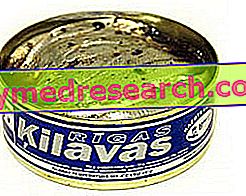Diet and kidney health
The kidneys (two) are organs responsible for the filtration (or purification) of the blood, therefore they are essential for human life. In order to guarantee its integrity, it is advisable to recognize and remove the etiological agents that can compromise them; among these: drug abuse, inappropriate food behaviors, alcoholism, sports doping, drug addiction, infections, hypertension, diabetes, impairment of other organs, etc.

Disorders and kidney failure
Kidney disorders are different and require special treatments; following the medical nephrological diagnosis, the nutrition professional intervenes on the subject's nutritional regime based on the metabolic needs that the specific disorder imposes.
- Nephritic syndrome: a nephritic syndrome is defined as an inflammatory process (mostly transient) caused by the toxic action of some bacteria (usually staphylococci). The nephritic syndrome is characterized by the reduction of the glomerular filtrate (the glomerulus is the vascular portion of the nephron) and due to progressive renal failure ; in addition, water retention and sodium (Na) significantly increase. The nephritic type renal insufficiency diet must absolutely confer a MINIMUM and essential contribution of proteins; the catabolism of amino acids (especially aromatic) worsens the nitrogen balance significantly altering the composition of the blood. Furthermore, given the reduced filtration capacity, it is also advisable to reduce the dietary content of electrolytes and water. In parallel, it is necessary to guarantee the right energy supply and constantly monitor the blood parameters; in the case of acute renal failure, hemodialysis, a therapy that replaces renal function, is essential.
- Nephrotic syndrome: the nephrotic syndrome can express both a primary glomerular pathology and other systemic disorders; it is characterized by urinary protein excretion which, in the long term, causes hypoproteidemia (reduced presence of proteins in the blood) and reduction in tissue protein quantity. The diet in the nephrotic syndrome aims at controlling hypertension through the reduction of food sodium, and at the same time keeps the protein content constant in order to buffer the hypoproteidemia induced by the abundant urinary losses; the reduction of sodium and the maintenance of the right concentration of plasma proteins avoid the establishment of blood hypertension and hypo-osmolarity, preventing the formation of interstitial edema (accumulation of liquids) which can also be serious. Simply put, it is NECESSARY to totally abolish added salt and all foods containing sodium; citing some: preserved in salt, in brine, seasoned cheeses, sausages, savory, bivalve molluscs, common bread, some baked goods such as crackers and breadsticks, stock cube with glutamate, etc.
- Chronic renal failure (CRF): is the destruction of a large number of nephrons (functional unit of the kidney) following the work of a morbid process; chronic renal failure is often the consequence of the continuation of some diseases or nephrological disorders. The diet for chronic renal failure is IPOPROTEIC and if established early it allows a reduction in pathological progress, as well as a significant increase in life expectancy. The metabolic alterations present in chronic renal failure are different:
- reduction of expulsion of protein catabolites: urea, uric acid, creatinine, guanidine
- reduced glucose tolerance and consequent hyperinsulinemia, hyperglucagonemia and increased gluconeogenesis
- increase in VLDL lipoproteins and reduction of HDL
- reduction of excretion of sodium, potassium, magnesium, phosphorus and water
- reduction of calcium absorption in the intestine due to hypo-production of vitamin D3 (1-25 OH)
- multi-vitamin deficiencies
- urinary loss of protein resulting in anemia.
The diet for chronic renal failure should promote weight loss only at an early stage, as it may later affect the blood pH favoring metabolic acidosis. The lipid intake must be moderate and mainly consisting of polyunsaturated fatty acids; with regard to proteins, it is better to guarantee a moderate intake of good biological value, and only in the case of urinary protein losses reach 1.4g / kg of body weight. It is advisable to significantly limit the intake of certain trace elements such as sodium, potassium and phosphorus, and at the same time supplement the diet with calcium, iron, folic acid and pyridoxine through the use of food supplements. In the case of dialysis, it should be taken into consideration that this procedure favors the elimination of many water-soluble compounds (such as vitamins), therefore, it would be appropriate to periodically provide for the compliance with specific requirements.
Finally, remember that the diet for renal failure is closely linked to the specific condition and the level of insufficiency; therefore, considering and considering that the needs of the patient are constantly modified by the pathological progress, also the administered alimentary regime must be modified accordingly. Nevertheless, table salt MUST be totally eliminated regardless of the severity of the deficiency and with it all the foods that contain it (see above, point 2); on the contrary, protein intake must be evaluated exclusively on the basis of urinary losses of plasma proteins. In fact, although the catabolic products of amino acids can damage an already compromised system, the significant protein deficiency would affect more (and in a decisive way) the health status of the patient with the manifestation of: edema, anemia, hypoalbuminemia, tissue deficiency etc.
It may be necessary to use hypoproteinic pharmaceutical foods (to limit the worsening of the nitrogen balance) and to evaluate the integration with modest quantities of essential amino acids. It is also advisable to drastically limit (and in some cases abolish) the use of foods containing high amounts of potassium (legumes, mushrooms, dried fruit, bananas, preserved fruit juices) and phosphorus (milk, cheese, sausages, meat and preserved fish).
This kind of feeding is to be considered a real clinical nutrition therapy, therefore the weights MUST be respected with extreme precision even in the long term, in order to limit the excesses and guarantee a sufficient energy supply for the best maintenance of the state of health .
Bibliography:
- Diet and nutrition science manual - A. Raimondi, C. Lucas - pag 191: 195



